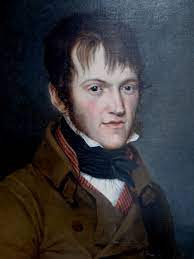Among the men associated with the Republican Army of the
North is a shadowy Frenchman who traveled with José Álvarez de Toledo and his party as they traveled from Philadelphia to Texas. He was identified by Henry Adams Bullard only as “LaTour,” a native of New
Orleans and had changed his name from Calinette. In fact, he was almost
certainly deceiving Bullard and Toledo. This man was Arsène Lacarrière-Latour,
not a Louisiana native but a French-born military architect who studied at the
Paris Academy of Fine Arts and likely participated in the French Revolution
before settling in New Orleans.
 |
| Arsene Lacarriere LaTour |
Latour moved to Haiti in 1793, but around 1802 he established himself in New Orleans, where he opened an architectural design firm and drafting school in 1810. The firm appeared to prosper with several important contracts over the next year, but Latour for some unknown reason traveled to Philadelphia, where he established a friendship with Don Juan Mariano Picornell, an old Spanish revolutionary. It was certainly through him was brought into Toledo’s scheme. He may have been a mere architect traveling for business, but his behavior shows a suspicious consistency of deception. Latour throughout his travels “adopted many personas” including an advance agent for Napoleon’s new empire in the Caribbean, businessman and engineer, according to historian Gene A. Smith, who added, “[Latour] wore many social masks and spoke in a variety of cultural dialects,” a man of shifting loyalties, but for whom the ultimate loyalty was to himself. “Propelled by the same self-interest that obsessed the sober-minded, this French adventurer exploited the competing empires and rival nationalities in the Gulf Coast to achieve personal success if not eternal glory. The evidence that Arsène Latour is Bullard’s “LaTour” is that Smith notes that he frequently traveled to the North and became associated with Picornell on one of his journeys.
In
the end, though, Latour appears to have departed the group in Louisiana and returned
home, where he would serve two years later on the staff of Gen. Jackson at the
Battle of New Orleans, and wrote a book about the campaign. [1]
[1] Edwin H. Carpenter, Jr. “Arsène
Lacarrière Latour” The Hispanic American Historical Review, Vol. 18, No. 2
(May, 1938), 222. Gene A. Smith, “Arsène Lacarrière-Latour: Immigrant,
Patriot-Historian, and Foreign Agent,” in Michael A. Morrison, ed., The Human Tradition in Antebellum America. (Wilmington,
DE: Scholarly Resources Inc., 2000), 83. Latour’s book was Historical memoir
of the War in West Florida and Louisiana in 1814-15, Published in 1816.
No comments:
Post a Comment